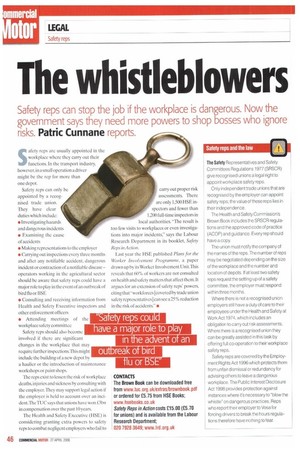The whistleblowers
Page 46

If you've noticed an error in this article please click here to report it so we can fix it.
Safety reps can stop the job if the workplace is dangerous. Now the government says they need more powers to shop bosses who ignore
risks. Patric Cunnane reports.
Safety reps are usually appointed in the workplace where they carry out their functions. In the transport industry, however,in a small operation a driver might he the rep for more than one depot.
Safety reps can only be appointed by a recognised trade union. They have clear duties which include: • Investigating hazards and dangerous incidents • Examining the cause of accidents • Making representations to the employer • Carrying out inspections every three months and after any notifiable accident, dangerous incident or contraction of a notifiable disease — operators working in the agricultural sector should be aware that safety reps could have a major role to play in the event of an outbreak of bird flu or BSE • Consulting and receiving information from Health and Safety Executive inspectors and other enforcement officers • Attending meetings of the work place safety committee Safety reps should also become involved if there are significant changes in the workplace that may require further inspections.This might include the building of a new depot by a haulier or the introduction of maintenance workshops or paint shops.
The reps exist to lessen the risk of workplace deaths, injuries and sickness by consulting with the employer.They may support legal action if the employer is held to account over an incident.The TUC says that unions have won Obn in compensation over the past 10 years.
The Health and Safety Executive (HSE) is considering granting extra powers to safety reps to combat negligent employers who fail to carry out proper risk assessments. There are only 1,500 HSE inspectors and fewer than 1,200 full-time inspectors in local authorities. "The result is too few visits to workplaces or even investigations into major incidents," says the Labour Research Department in its booklet, Safety Reps in Action.
Last year the HSE published Plans fir the Worker Involvement Programme, a paper drawn up by its Worker Involvement Unit.This reveals that 60% of workers are not consulted on health and safety matters that affect them. It argues for an extension of safety reps' powers, citing that "workforces [covered by trade union safety representatives] can see a25% reduction in the risk of accidents." • Safety reps and the law The Safety Representatives and Safety Committees Regulations 1977 (SRSCR) give recognised unions a legal right to appoint workplace safety reps.
Only independent trade unions that are recognised by the employer can appoint safety reps; the value of these reps lies in their independence.
The Health and Safety Commission's Brown Book includes the SRSCR regulations and the approved code of practice (ACOP) and guidance. Every rep should have a copy.
The union must notify the company of the names of the reps. The number of reps may be negotiated depending on the size of the workplace and the number and location of depots. If at least two safety reps request the setting up of a safety committee, the employer must respond within three months.
Where there is not a recognised union employers still have a duty of care to their employees under the Health and Safety at Work Act 1974, which includes an obligation to carry out risk assessments. Where there is a recognised union they can be greatly assisted in this task by offering full co-operation to their workplace safety reps.
Safety reps are covered by the Employment Rights Act 1996 which protects them from unfair dismissal or redundancy for advising others to leave a dangerous workplace. The Public Interest Disclosure Act 1998 provides protection against instances where it's necessary to "blow the whistle" on dangerous practices. Reps who report their employer to Vosa for forcing drivers to break the hours regulations therefore have nothing to fear.




































































































































































































